Let’s talk about how different cultures view gambling. It’s fascinating how what seems totally normal in one part of the world might raise eyebrows or even get you in serious trouble in another. You know how Las Vegas lights up the Nevada desert with its promise of excitement and fortune? Well, for some societies, those same bright lights represent something much darker.
Think about it this way: gambling isn’t just about placing bets or playing cards. It’s wrapped up in centuries of religious beliefs, family values, and social expectations. Some cultures see it as harmless entertainment, while others view it as a dangerous vice that tears families apart. Pretty wild how perspectives can differ so dramatically, right?
Take a walk through Monaco’s glamorous Monte Carlo casino, and you’ll find European elites treating gambling as a sophisticated pastime. But travel to certain Middle Eastern countries, and you might find that even a friendly poker game could land you in hot water. These stark contrasts tell us something interesting about humanity – how our moral compasses are shaped by the cultures we grow up in.
What really stands out is how these attitudes aren’t set in stone. They shift and evolve with time, just like society itself. So next time you’re thinking about cultural differences, remember that gambling is one of those perfect examples of how what’s totally fine in one place might be completely off-limits in another. It’s just one more reminder of how wonderfully complex our world really is.
Religious Views on Games of Chance
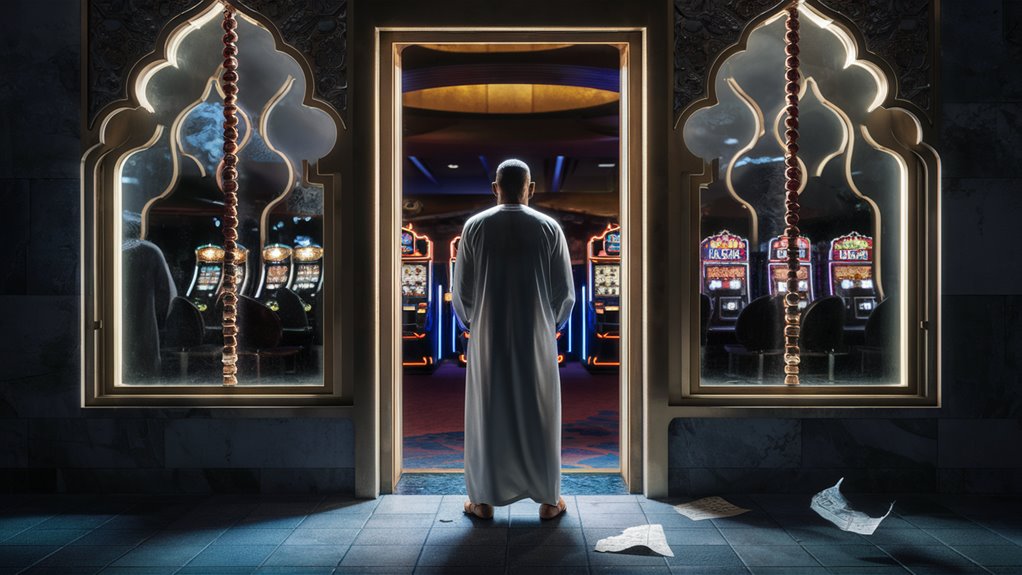
Let’s talk about how different religions view games of chance – it’s actually pretty fascinating stuff. You know how some people love a game of poker or buying lottery tickets? Well, various faiths have some strong opinions about that.
Islam takes probably the toughest stance on gambling. If you’re Muslim, you’ve likely heard about the Quran’s clear message against “maisir,” which basically means games of chance.
Muslim scholars don’t mince words here – they consider gambling completely off-limits, or “haram,” warning that it can tear families apart and feed into unhealthy greed.
When it comes to Christianity, things get a bit more complicated. The Bible doesn’t come right out and say “don’t gamble,” but many Christian leaders aren’t big fans.
It’s kind of interesting, actually – some denominations take different approaches. Ever notice how Catholic churches often run bingo nights? Meanwhile, most Protestant churches tend to frown on pretty much any form of gambling.
Judaism has its own take on the matter. The Talmud isn’t too keen on gambling, especially when it comes to professional gamblers.
Think about it this way: Jewish scholars argue that gambling doesn’t create anything new, it just moves money around, often causing family problems.
But here’s a fun fact – during Hanukkah, many Jewish families play dreidel, though they usually stick to playing for chocolate coins or tokens instead of real money.
All these religious views have really shaped how different countries approach gambling laws, especially in places where these faiths have strong influence. It’s amazing how ancient religious teachings still influence modern-day attitudes toward something as simple as a game of chance.
East Asian Gambling Paradox
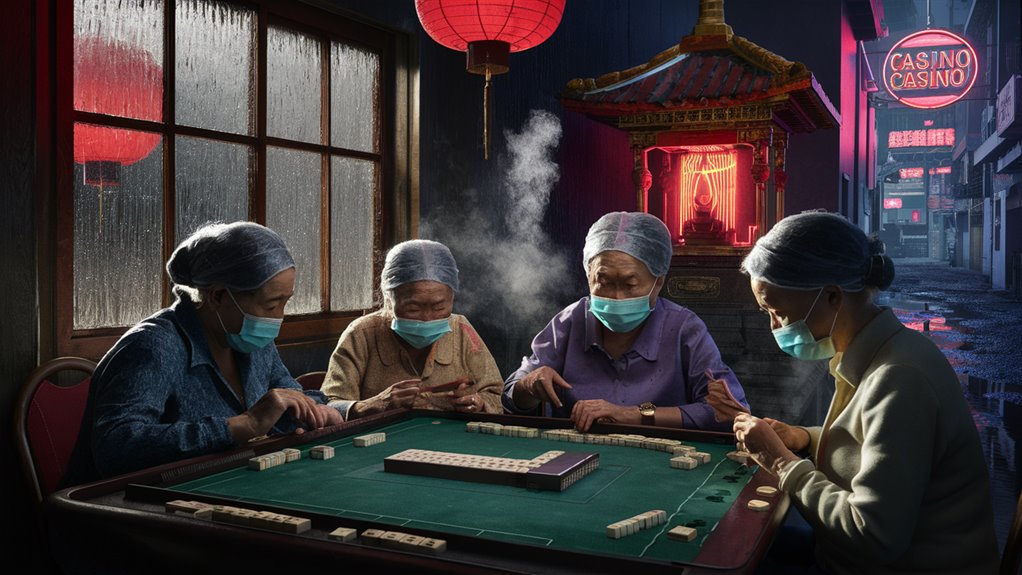
Let’s dive into one of the most fascinating contradictions in East Asian culture – the complex relationship with gambling. You might think gambling rules are straightforward, but in countries like China, Japan, and Korea, things get really interesting.
These nations officially frown upon most forms of gambling, yet if you look closer, you’ll find gambling deeply rooted in their daily lives and traditions.
Take China, for example. Games of chance have been lighting up festivals and celebrations for thousands of years. It’s pretty mind-boggling when you realize that modern gambling hotspots like 토토사이트 보증 Macau rake in way more money than Las Vegas.
What makes this even more intriguing is how many East Asian governments play both sides – they maintain strict anti-gambling laws while happily collecting profits from state lotteries and special casino zones.
So why the mixed signals? Well, it all comes down to Confucian values. These traditional beliefs put a big emphasis on keeping society harmonious and avoiding personal excess.
But here’s the twist: they also recognize how gambling can bring people together and celebrate good fortune. Pretty contradictory, right?
You know what’s really interesting? Many East Asians don’t even see certain games as gambling. Take mahjong or pachinko, for instance.
To them, these aren’t really gambling activities at all, but more like social pastimes or entertainment. This clever cultural reframing helps explain why you’ll spot so many people enjoying these games, even with all the official restrictions and social stigma floating around.
It’s just their way of bending the rules while keeping traditions alive.
Western Acceptance and Social Stigma
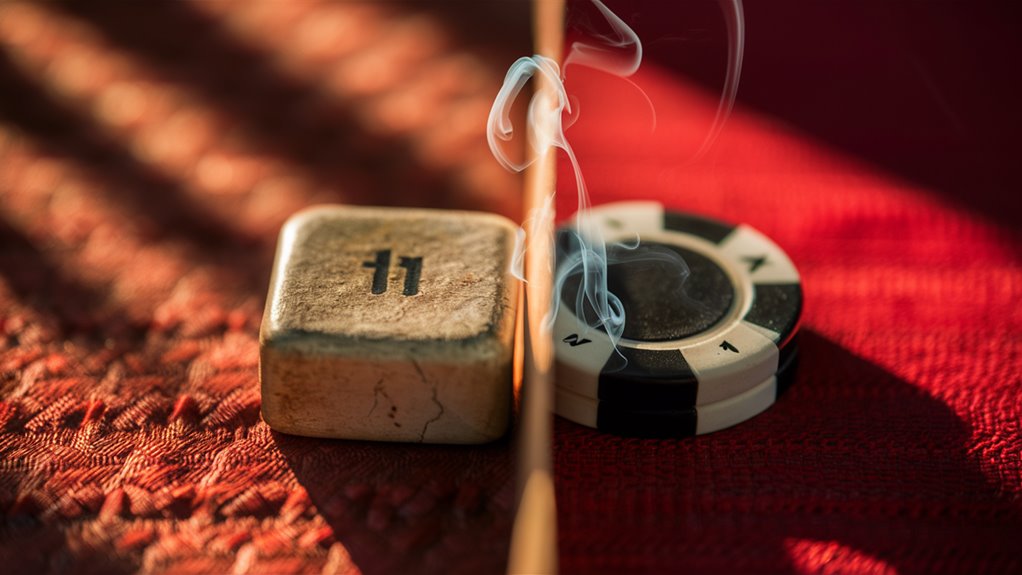
Let’s break down the fascinating love-hate relationship Western society has with gambling. You know how some things in our culture just seem complicated? Well, gambling definitely fits that bill.
It all started with religious influences, particularly those strict Protestant values that shaped how people viewed betting and games of chance.
Think about it – while the Church was busy condemning gambling as a sin, people kept right on betting anyway, just moving their activities underground. It’s kind of like trying to ban chocolate – people will always find a way to get their fix!
Fast forward to today, and things look pretty different. Most Western societies have embraced regulated gambling in a big way. State lotteries, fancy casinos, sports betting apps – they’re everywhere you look.
But here’s the interesting part: we still can’t quite make up our minds about it. While millions of people enjoy gambling as entertainment, there’s still this lingering shadow of shame around it, especially when addiction enters the picture.
The media really plays up this split personality too. On one hand, you’ve got these glamorous poker tournaments and glitzy casino scenes in movies. But flip the channel, and you might catch a sobering documentary about gambling addiction and families torn apart by debt. Talk about mixed messages!
Even governments seem caught in this back-and-forth. They’re happy to collect gambling revenue for public services, but they also face pressure to deal with gambling’s darker side. It’s like they’re standing at the roulette table with one foot in and one foot out.
This push-pull relationship runs deep in Western culture. We’ve created this weird situation where gambling is both totally fine and kind of questionable at the same time.
Just think about it – you can buy lottery tickets at the grocery store, but you might hesitate to tell your grandmother about your poker night winnings!
Islamic Perspectives on Betting
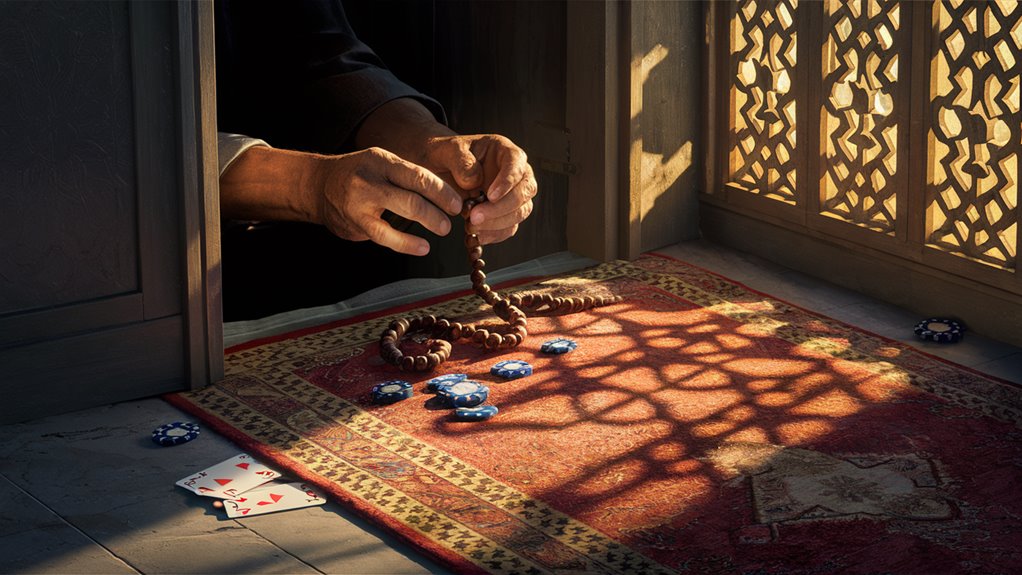
Let’s break down why Islamic teachings take such a firm position on betting. You know how some things just don’t sit right with both your moral compass and practical reasoning? Well, that’s exactly the case here.
Islamic scholars point out several real-world problems that come with gambling. Think about it – how many times have we heard stories about people losing their life savings or watching their families fall apart because of 먹튀검증 커뮤니티에서 얻을수 있는 정보 gambling addiction?
What really stands out is the concern about creating wealth without actual productive work. It’s kind of like trying to get rich through shortcuts instead of honest labor. Islamic scholars argue that when people win big through betting, it doesn’t contribute anything meaningful to society.
Instead, it often takes money from those who can least afford to lose it. This way of thinking has had a big impact on how Islamic banking works. If you walk into an Islamic bank today, you’ll find they’re pretty careful about where they put their money.
They need to make absolutely sure none of their investments have anything to do with gambling operations. It’s not just about following rules – it’s about maintaining a financial system that promotes fair and productive economic activity.
Indigenous Traditions and Gambling
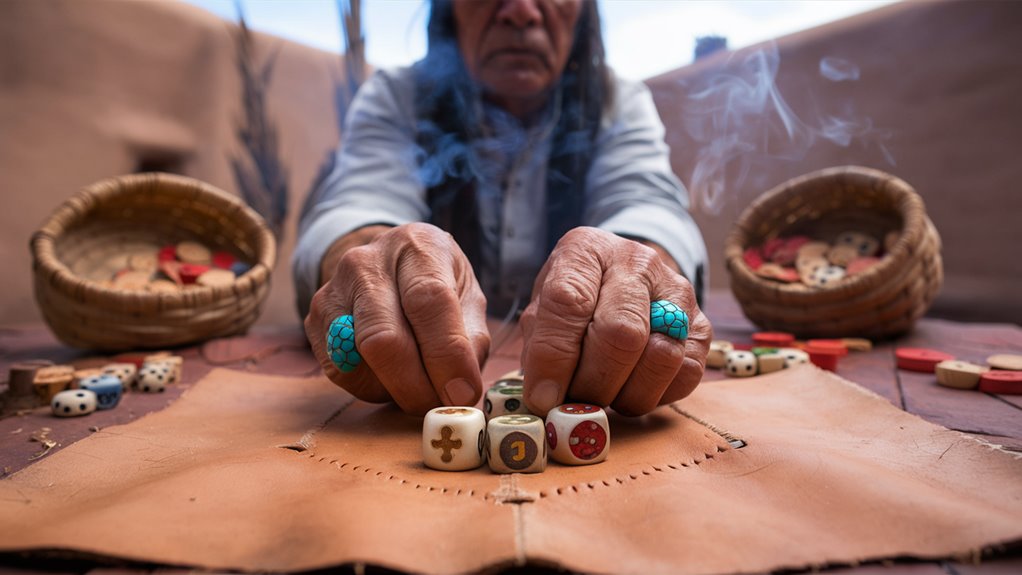
Let’s dive into the fascinating world of indigenous gambling traditions. You might be surprised to learn that many indigenous cultures have a completely different take on gambling than what we’re used to today.
Think of it less as a casino night out and more like a meaningful cultural ceremony.
Native American tribes, for instance, didn’t just play games for fun. They wove gambling into the fabric of their spiritual life, using it in healing ceremonies and as a clever way to share resources throughout their communities.
It’s kind of like how we might use community fundraisers today, but with deeper spiritual meaning.
Ever heard of Aboriginal “card circles” in Australia? These weren’t your typical poker nights. These gatherings served as social glue, bringing people together and keeping their traditions alive.
Pacific Islander communities had a similar approach, making gambling an important part of their festivals and cultural celebrations.
But here’s the thing – things got complicated when colonization entered the picture. Traditional gambling practices that once strengthened communities have largely been replaced by modern commercial gambling.
It’s a bit like watching a traditional family recipe become mass-produced fast food. Many indigenous communities now face serious challenges with problem gambling, and their leaders are working hard to find balance.
They’re trying to preserve what made their traditional gambling practices special while dealing with today’s realities.
You know what’s interesting? These communities are now in a tricky spot, trying to honor their heritage while protecting their people from the downsides of modern gambling.
It’s a complex challenge that shows how cultural practices can change dramatically when they’re taken out of their original context.
Modern Digital Gaming Controversies
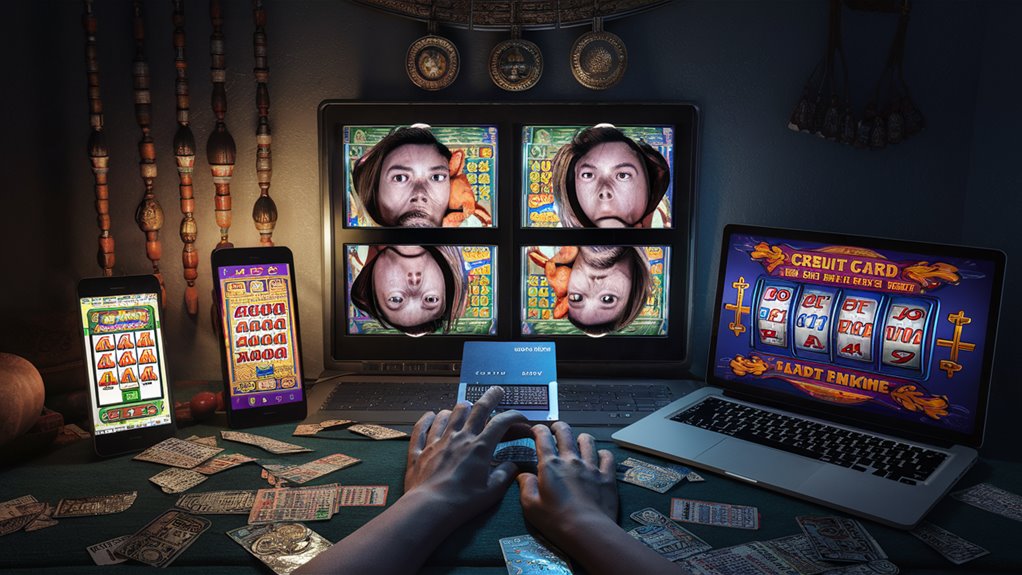
Let’s talk about the wild world of digital gaming and its controversial gambling elements. You know how traditional casinos have their slot machines and poker tables? Well, modern video games have created their own versions with loot boxes, gacha systems, and crypto gaming features.
Think about it. When you’re playing your favorite mobile game and spend a few bucks to open a mystery box, you’re basically pulling a digital slot machine lever. These mechanics have sparked quite a debate in the gaming community, with many folks wondering if we should even call it gaming anymore.
What’s really concerning is how these features are showing up in games that kids love to play. While you need to show ID and be of legal age to walk into a casino, any kid with a smartphone can tap away at games with gambling-style elements.
It’s no wonder some countries have started cracking down on this. Belgium and the Netherlands have already said “no thanks” to loot boxes, while Japan keeps a pretty tight leash on their gacha games.
And just when you thought it couldn’t get more complicated, cryptocurrency gaming entered the chat. Now we’re talking about games where players can win or lose actual value through digital tokens and NFTs.
This has got regulators scratching their heads, trying to figure out if these games should follow the same rules as traditional gambling, especially since they often operate in this weird gray area of digital finance.
What makes this whole situation trickier is that these games are incredibly engaging and fun to play. But at what point does entertainment cross the line into gambling? That’s the million-dollar question that players, developers, and lawmakers are still trying to figure out.
Generational Shifts in Gambling Attitudes
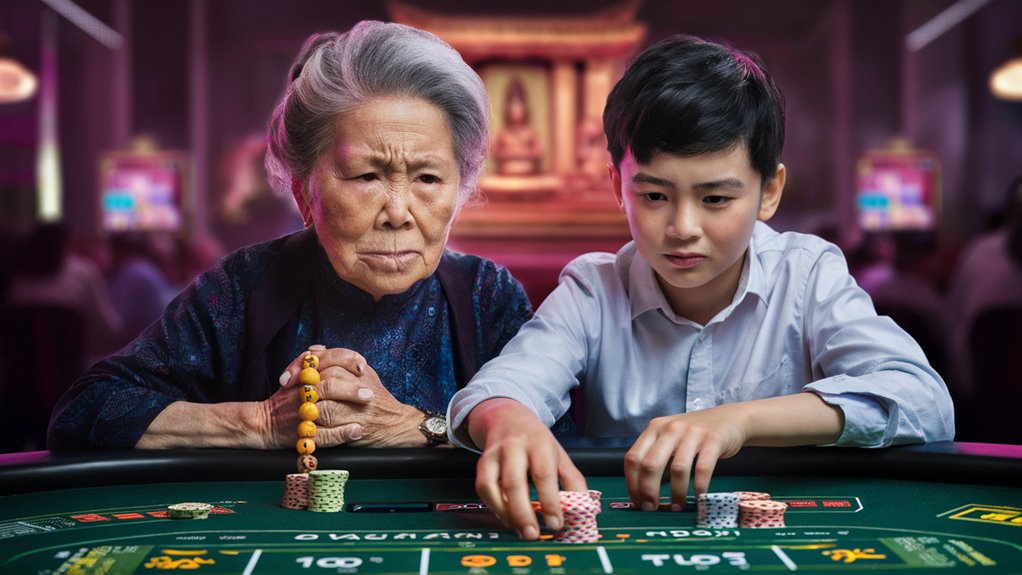
Let’s talk about how different generations view gambling. It’s fascinating to see how attitudes have shifted over time, and you might be surprised by some of these changes.
Baby Boomers tend to think about gambling in a pretty traditional way. Picture your uncle who only trusts brick-and-mortar casinos and wouldn’t dream of placing a bet online.
They often carry some moral reservations about gambling, shaped by years of seeing it as something that happens in smoke-filled rooms and dark corners.
Generation X sits somewhere in the middle, and they’ve had a front-row seat to gambling’s big makeover. They watched it transform from something slightly taboo into mainstream entertainment.
While they’re comfortable with both old-school betting shops and digital platforms, they typically keep their gambling separate from other forms of entertainment.
Now, when it comes to Millennials and Gen Z, well, they see things quite differently. Think about it: they’ve grown up in a world where gaming and gambling often look pretty similar.
To them, placing a bet through an app feels as natural as ordering takeout or scrolling through social media. The interesting thing is, while they’re more accepting of gambling as entertainment, they’re also pretty savvy about the risks involved.
Thanks to all the conversations around mental health these days, they’re usually well-informed about addiction and responsible gaming.
You know what’s really interesting? Each generation’s approach tells us something about the times they grew up in. From the cautious Boomers to the tech-savvy younger folks, it’s like watching society’s relationship with gambling evolve right before our eyes.
Legal Versus Cultural Restrictions

Let’s talk about the fascinating world of gambling restrictions. You know how sometimes what’s legally allowed doesn’t quite match up with what society accepts? Well, that’s exactly what we see when looking at gambling around the world.
Take Asia, for instance. While many countries there have pretty strict gambling laws on the books, you’ll still find people gathering for traditional mahjong games or friendly betting circles.
It’s deeply woven into their cultural fabric, even if the law says otherwise. Then there’s the Middle East, where both religious beliefs and legal systems team up to create a complete no-go zone for gambling activities.
The Western world tells a different story. In places like Las Vegas, you can legally place bets all day long, but try telling your conservative aunt about your poker night, and you might get quite the lecture. It’s pretty interesting how that works, right?
The UK has betting shops on practically every high street, totally legal and everything, but you’ll still find plenty of people and groups who strongly disapprove.
Here’s the thing about these cultural restrictions: they often pack more punch than any law could. You might live somewhere where gambling is perfectly fine on paper, but good luck explaining those casino visits at your workplace or family dinner.
Sometimes these unwritten rules and social pressures shape our behavior more than any official regulation ever could. It’s like having an invisible fence that keeps us in check, even when the legal gates are wide open.
Strange how that works, isn’t it? The law might say one thing, but society often has its own ideas about what’s acceptable.
Common Questions
How Do Gambling Superstitions Vary Between Different Cultures?
You know what’s fascinating about gambling superstitions? They’re incredibly different depending on where you’re from. Take lucky numbers, for instance. In China, people absolutely swear by the number 8, and you’ll see players gravitating toward it at gaming tables. Why? Well, it sounds similar to their word for wealth and prosperity.
Meanwhile, Western gamblers tend to put their faith in lucky number 7. Just think about all those slot machines with their triple sevens! But here’s where it gets interesting – in many Asian countries, you’ll rarely see the number 4 in casinos. It’s considered seriously unlucky because it sounds similar to the word for death in several Asian languages.
The good luck charms are just as varied. Some Buddhist cultures have this tradition of gently rubbing Buddha statues for good fortune before placing their bets. In Western culture, you might spot players clutching rabbits’ feet or carrying four-leaf clovers in their pockets. Some Italian gamblers even keep red horn charms close by while playing.
These beliefs might seem quirky, but they’re deeply woven into how different cultures approach gambling. Pretty amazing how something as universal as trying your luck can be interpreted so differently around the world, isn’t it?
What Role Do Traditional Healing Practices Play in Treating Gambling Addiction?
You know, when it comes to treating gambling addiction, traditional healing practices actually play a fascinating role in recovery. Let’s talk about how ancient wisdom meets modern challenges. Traditional healers often tap into centuries-old techniques, like guided meditation and calming herbal remedies, that can help people regain their emotional balance. Think of it as hitting the reset button on those overwhelming urges to gamble.
What’s really interesting is how these healers blend spiritual ceremonies with cultural rituals that have been passed down through generations. Imagine sitting in a peaceful circle during a cleansing ceremony, letting go of the weight that gambling has placed on your shoulders. These practices aren’t just about treating addiction – they’re about healing the whole person, mind, body, and spirit.
But here’s the thing: many people find the best results when they combine these traditional approaches with modern therapy. It’s like having the best of both worlds. Your weekly counseling sessions might work alongside ancient breathing techniques or community healing circles. Some folks start their day with traditional herbal tea to reduce anxiety, then head off to their regular therapy appointment.
And honestly, this mix-and-match approach makes a lot of sense. After all, gambling addiction isn’t just about the behavior itself – it’s connected to deeper emotional and spiritual needs that traditional practices are particularly good at addressing.
How Do Immigrant Communities Balance Their Home Culture’s Gambling Views Abroad?
You know how moving to a new country brings all sorts of challenges? Well, for many immigrant families, one of the trickiest parts is figuring out where they stand on gambling. Back home, they might have grown up with strict rules about betting and casinos, but now they’re living somewhere that sees things totally differently.
Think about it like this: Picture a family who moves from a country where gambling is completely off-limits to a place where lottery tickets are sold at every corner store and casino billboards light up the highways. It’s not just about whether to play or not – it’s about holding onto important cultural values while trying to fit into their new home.
Some families stick firmly to their traditional views, while others find themselves somewhere in the middle. Maybe the parents still frown upon gambling, but their kids are growing up seeing their friends’ families enjoy a friendly poker night or buying scratch cards. It’s a balancing act that plays out differently in each household, as they work through what feels right for them in their new cultural landscape.
This push and pull between old and new perspectives isn’t just about gambling – it’s really about the bigger picture of keeping cultural identity alive while adapting to a different way of life. Pretty complex stuff when you think about it, right?
What Impact Do Gambling Translations and Terminology Have Across Different Languages?
Let’s talk about how gambling terms get tricky when you cross language barriers. You know how confusing it can be when someone tries to explain poker rules in a different language? Well, that’s just the tip of the iceberg.
Think about it – a simple term like “house edge” might mean something completely different when translated literally into Spanish, Chinese, or German. And when players can’t fully grasp these crucial terms, it’s not just frustrating – it can lead to some serious misunderstandings about how games work.
The real challenge comes with responsible gambling messages. Imagine trying to explain complex betting limits or warning signs of problem gambling to someone who speaks a different language. What might sound crystal clear in English could lose its urgency or meaning entirely when translated into another language.
Even odds and betting terminology can get lost in translation. A “parlay” in American sports betting might be called an “accumulator” in British English, and that’s just within English-speaking countries! Now picture explaining these concepts across multiple languages and cultures.
This language gap isn’t just about words – it affects how players understand their risks and responsibilities. Casino staff often struggle to explain important rules or safety measures to international visitors, which can make gambling more risky for everyone involved.
Bottom line? When it comes to gambling across languages, clear communication isn’t just nice to have – it’s essential for keeping things fair and safe for all players.
How Do Funeral and Mourning Customs Affect Gambling Participation Globally?
You know, it’s fascinating how different cultures approach gambling during times of loss. In many Asian societies, mourning customs take gambling restrictions pretty seriously. Think about it – when a family member passes away, there’s often a strict “no gambling” period that can last anywhere from a few weeks to several months. It’s not just about personal choice either – these traditions run deep, and communities really expect people to show respect by stepping away from the gaming tables or lottery tickets during this time. For instance, in traditional Chinese families, gambling during the mourning period is seen as not just disrespectful to the deceased, but also as potentially bringing bad luck to the entire family. Some communities even extend these customs to include distant relatives, where the whole extended family is expected to pause their gambling activities until the mourning period ends. So while we might think of gambling as just another form of entertainment, in many parts of the world, it’s deeply intertwined with cultural values and respect for the departed.